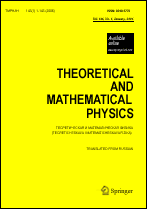|
This article is cited in 5 scientific papers (total in 5 papers)
Separability and entanglement in tripartite states
Shunlong Luoa, Wei Sunb
a Academy of Mathematics and Systems Science, Chinese Academy of Sciences, Beijing, People's Republic
of China
b Department of Mathematics and Statistics, Concordia University,
Montreal, Quebec, Canada
Abstract:
While classical correlations can be freely distributed among many systems, this is not true for entanglement and quantum correlations. If a quantum system $S^a$ is entangled with another quantum system $S^b$, then its entanglement with any third quantum system $S^c$ cannot be arbitrary. This is the celebrated monogamy of entanglement. Implicit in this general statement is the plausible belief that only entanglement between the systems $S^a$ and $S^b$ constrains the entanglement between $S^a$ and the third system $S^c$. We demonstrate that even classical correlations between $S^a$ and $S^b$ may impose surprisingly stringent restrictions on the possible entanglement between $S^a$ and $S^c$. In particular, perfect bipartite classical correlations and full entanglement cannot coexist in any tripartite state. An intuitive explanation of this monogamy of hybrid classical and quantum correlations might be that the system $S^a$ has a correlating capability, which cannot be used to establish any entanglement with a third system (but can still be used to establish classical correlations) if it is exhausted when correlated with $S^b$ (in either a classical or quantum fashion). This may be interpreted as an alternate version of monogamy.
Keywords:
correlation, classical state, tripartite state, entanglement, separability.
Received: 26.11.2008
Citation:
Shunlong Luo, Wei Sun, “Separability and entanglement in tripartite states”, TMF, 160:3 (2009), 534–544; Theoret. and Math. Phys., 160:3 (2009), 1316–1323
Linking options:
https://www.mathnet.ru/eng/tmf6414https://doi.org/10.4213/tmf6414 https://www.mathnet.ru/eng/tmf/v160/i3/p534
|


|




 Contact us:
Contact us: Terms of Use
Terms of Use
 Registration to the website
Registration to the website Logotypes
Logotypes







 Citation in format
Citation in format 
